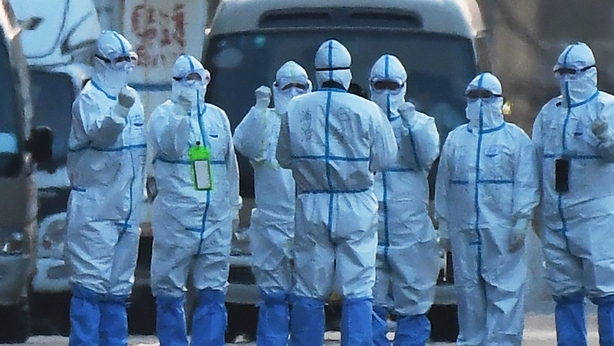Five years ago, the World Health Organization announced Covid-19 had become a pandemic - a moment when the world finally woke up to the unfolding disaster.
The WHO had already sounded its own highest alarm five weeks earlier. But that warning - which does not mention the "p" word - had gone unheeded.
At a news conference on 11 March 2020, head of the United Nations' health agency, Tedros Adhanom Ghebreyesus, finally said the worsening outbreak could be "characterised as a pandemic".
Only then did many countries grasp the severity of the situation and - way too late - jolt into action.
The pandemic, the likes of which had not been seen in a century, killed millions, shredded economies and crippled health systems.
SHOC room scene
Dr Tedros had already rung the world's top alarm bell by declaring a Public Health Emergency of International Concern on 30 January, 2020. The PHEIC lasted until 5 May 2023.
Throughout February 2020, journalists had repeatedly asked about a pandemic and at a press conference on 9 March, Dr Tedros indicated "the threat of a pandemic has become very real".
The 11 March press conference was scheduled for 5pm (4pm Irish time) in the Strategic Health Operations Centre (SHOC) lower room at the WHO's headquarters in Geneva.

The emergency ops hub was being used for WHO internal morning updates on Covid and informing the press in the afternoon.
The 59-minute press briefing featured Dr Tedros, WHO emergencies director Michael Ryan and Maria Van Kerkhove, technical lead at the WHO health emergencies programme.
Dr Tedros took two pens from his jacket, adjusted his glasses, looked round the room and read his bombshell update from a print-out on his desk.
World Health Organization declares coronavirus outbreak a pandemic | https://t.co/T1pbxcW6gt pic.twitter.com/ULKCIQOeZ7
— RTÉ News (@rtenews) March 11, 2020
He began by saying how the number of cases outside China had increased 13-fold in the past fortnight and the number of affected countries had tripled to 114. Some 4,291 people were dead and thousands more in hospital.
"We're deeply concerned both by the alarming levels of spread and severity - and by the alarming levels of inaction," Dr Tedros said.
"We have therefore made the assessment that Covid-19 can be characterised as a pandemic."
'I need to speak to you about coronavirus'
On 12 March, then Taoiseach Leo Varadkar announced that schools, collages and childcare facilities in Ireland would close until 29 March because of Covid-19.
The 29 March deadline passed and the country stayed in full lockdown for three months, before a staggered and gradual reopening over several months into 2021, with periodic lockdowns throughout as cases spiked.
WATCH: Full speech by Taoiseach Leo Varadkar as the country's schools, colleges and childcare facilities are to close in response to the Covid-19 pandemic | Read more: https://t.co/0dZzTUDn4s pic.twitter.com/URGFZUb2jn
— RTÉ News (@rtenews) March 12, 2020
In his address to the country, from Washington DC on 12 March 2020, Mr Varadkar said: "We have not witnessed a pandemic of this nature in living memory. This is unchartered territory.
We said we would take the right actions at the right time.
We have to move now to have the greatest impact."
Game-changer
Veteran correspondent John Zarocostas was sitting three seats along from Van Kerkhove.
"The word 'pandemic' changed the game," he told AFP, which also attended the historic briefing.
He said the shift came as a greater shock to the outside world than to those in the room, who had been following WHO briefings.
"I had a feeling they (the WHO) had to do that because they were not getting the anticipated member state reaction" from the PHEIC declaration weeks earlier, he explained.
"It changed the political dynamics in terms of national government reaction. They all moved into full gear."
The WHO saw the announcement as describing a situation that had become evident, rather than declaring a new level of emergency. But the world saw it differently.
"The world was possessed with the word pandemic," a frustrated Ryan said on the March 2022 anniversary.
"The warning in January (2020) was way more important than the announcement in March.
"Do you want the warning to say you've just drowned? Or would you like the warning to say the flood is coming?"
New 'pandemic emergency' button
The Covid-19 pandemic upended human society.
And it could happen again.
The WHO says the next pandemic is only a matter of time.
In December 2021, WHO member countries began drafting an accord on pandemic prevention, preparedness and response, to address the failures exposed by Covid-19.
They have one final negotiating session next month to finalise the text for the WHO's annual assembly in May.
They have already agreed that the WHO head will, from September, be able to declare an even higher-level "pandemic emergency" - a PHEIC with pandemic potential - which should hopefully grab more attention.
Dr Tedros continues to warn countries against repeating the cycle of neglect followed by panic that characterised the build-up to March 12, 2020.

